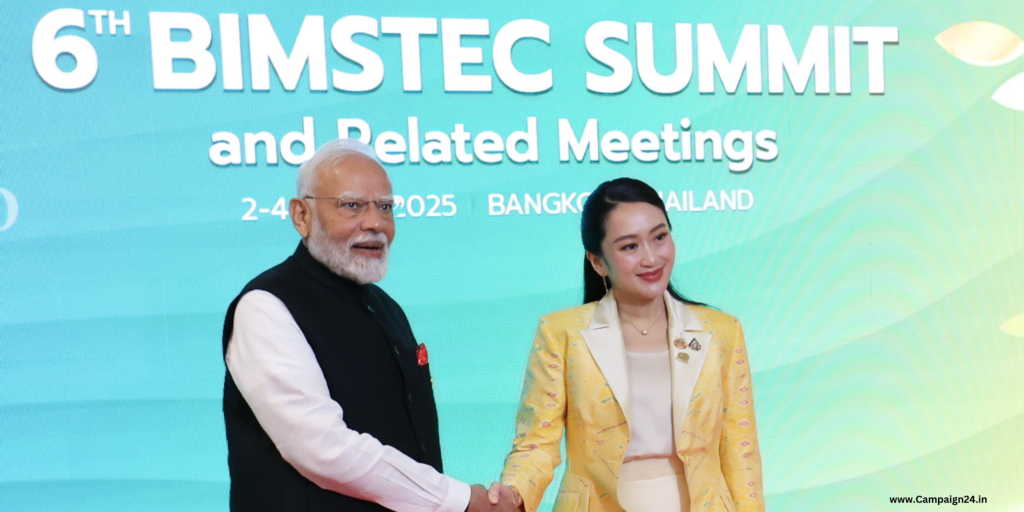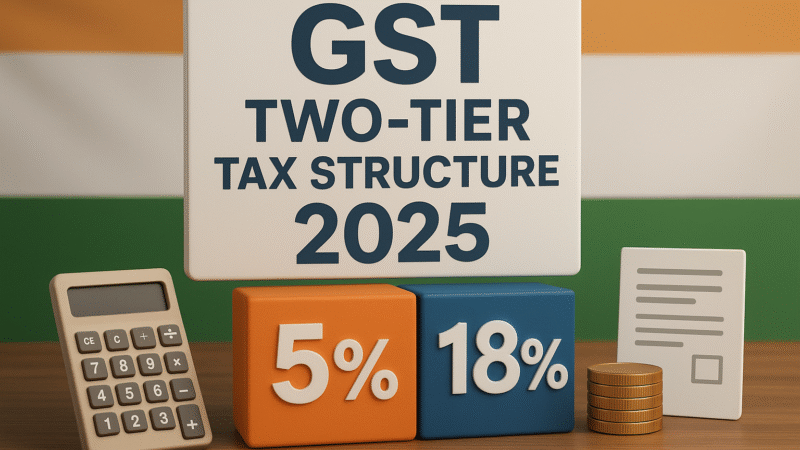Prime Minister Narendra Modi at the 6th BIMSTEC Summit in Thailand: Strengthening Regional Cooperation

PM Modi’s Participation in the 6th BIMSTEC Summit
On Thursday, Prime Minister Narendra Modi participated in the 6th edition of the BIMSTEC (Bay of Bengal Initiative for Multi-Sectoral Technical and Economic Cooperation) Summit, which was held in Thailand. The summit brought together leaders from the BIMSTEC member nations to discuss ways to enhance cooperation and collaboration in various sectors. The event was of significant importance, marking a pivotal moment in strengthening ties between the countries in the South Asian and Southeast Asian regions.
Prime Minister Modi was warmly welcomed by the Thai Prime Minister, Paetongtarn Shinawatra, as he arrived in Bangkok to attend the summit. The meeting underscored the growing importance of BIMSTEC as a regional body and highlighted India’s commitment to fostering greater cooperation within the grouping.
Key Highlights of the 6th BIMSTEC Summit
The 6th BIMSTEC Summit in Thailand focused on deepening cooperation across multiple sectors, including economic collaboration, security, digital connectivity, climate change, and people-to-people exchange. Prime Minister Modi, in his address at the summit, reaffirmed India’s dedication to working together with BIMSTEC nations to address shared challenges and opportunities.
PM Modi, reflecting on the significance of the summit, expressed optimism about the future and said, “With fellow BIMSTEC leaders at the Summit in Bangkok, we reaffirm our commitment to boosting cooperation across diverse sectors. May our efforts bring a positive difference in people’s lives.”
One of the more poignant moments of the summit was when the leaders observed a minute of silence in remembrance of the victims of the devastating earthquake that struck Myanmar and Thailand on March 28, 2025. The earthquake caused significant damage and loss of life, leaving a lasting impact on the region. In his speech, PM Modi conveyed heartfelt condolences, expressing sympathy for those affected by the natural disaster and highlighting India’s solidarity with its neighbors.

PM Modi’s Proposal for Connecting Payment Systems: A Game Changer for BIMSTEC
In a significant development during the summit, Prime Minister Modi proposed that BIMSTEC nations should integrate their payment systems with India’s Unified Payments Interface (UPI). The UPI has been widely recognized as one of the most advanced and efficient digital payment systems globally, and this proposal aims to streamline financial transactions across the region.
India’s UPI has revolutionized the way people conduct digital transactions, and Modi’s proposal to integrate it with the payment systems of BIMSTEC countries is expected to provide a significant boost to regional trade, tourism, and cross-border business. The integration of payment systems would also promote greater ease of conducting business between the nations, making financial transactions faster, cheaper, and more secure.
During the summit, PM Modi emphasized that such an integration would not only improve economic transactions but also facilitate greater regional connectivity. “By connecting our payment systems, we can foster a seamless flow of business, enhance trade, and encourage tourism,” PM Modi stated.
This proposal is seen as an important step toward making BIMSTEC a more cohesive regional bloc in terms of economic connectivity, paving the way for a more digitally connected South and Southeast Asia.
PM Modi’s Bilateral Engagement with Myanmar’s Senior General Aung Hlaing
Before the start of the official summit proceedings, Prime Minister Modi also met with Senior General Min Aung Hlaing of Myanmar. The bilateral meeting focused on enhancing the relationship between India and Myanmar, particularly in areas such as trade, infrastructure development, and regional security. Myanmar has been a key partner for India in its efforts to maintain stability and security in the Bay of Bengal region, and the two nations share a long border with several cross-border concerns, including trade and security issues.
PM Modi and Senior General Aung Hlaing discussed the importance of strengthening bilateral ties and addressing the challenges posed by regional instability. Both leaders expressed their commitment to enhancing cooperation in areas like border security, connectivity, and counter-terrorism.
Thai PM Paetongtarn Shinawatra Hosts a Dinner for BIMSTEC Leaders
Prior to the official summit proceedings, Thai Prime Minister Paetongtarn Shinawatra hosted a dinner for the BIMSTEC leaders at the Shangri-La Hotel, located on the picturesque banks of the Chao Phraya River. This informal gathering allowed leaders to discuss key issues in a relaxed atmosphere, strengthening interpersonal relationships and fostering cooperation outside the formal summit setting.
During the dinner, PM Modi and Bangladesh’s Chief Adviser Muhammad Yunus were seated together. Photographs shared by Yunus’ office showed the two leaders engaged in conversations, further emphasizing the importance of strengthening ties between India and Bangladesh, two key players in the BIMSTEC group.
FAQs: Understanding the BIMSTEC Summit and Its Implications
1. What is BIMSTEC, and what are its objectives?
BIMSTEC stands for the Bay of Bengal Initiative for Multi-Sectoral Technical and Economic Cooperation. It is a regional organization comprising seven countries: India, Bangladesh, Myanmar, Sri Lanka, Thailand, Bhutan, and Nepal. The objective of BIMSTEC is to promote economic cooperation, technical collaboration, and sustainable development across various sectors like trade, transport, energy, and people-to-people connectivity. The organization aims to build a bridge between South Asia and Southeast Asia.
2. What is UPI, and why is it important for BIMSTEC countries?
Unified Payments Interface (UPI) is a real-time payment system developed by the National Payments Corporation of India. It allows users to transfer money between bank accounts instantly, facilitating seamless digital transactions. UPI has gained popularity in India due to its simplicity and effectiveness. PM Modi’s proposal to link BIMSTEC nations’ payment systems with UPI aims to enhance cross-border financial transactions, boost regional trade, and improve economic cooperation between member countries.
3. What was the significance of the minute of silence during the summit?
The minute of silence observed during the summit was in honor of the victims of the March 28 earthquake that struck Myanmar and Thailand. The earthquake caused widespread devastation and loss of life, and the leaders of BIMSTEC took a moment to pay their respects to those who lost their lives and to express solidarity with the affected nations.
4. How will the integration of UPI with BIMSTEC countries’ payment systems benefit the region?
The integration of UPI with the payment systems of BIMSTEC countries is expected to improve regional trade and tourism by making financial transactions faster, more efficient, and secure. It would provide businesses and individuals with a unified payment platform, reducing barriers to cross-border transactions and encouraging greater economic exchange.
5. What is the role of the 6th BIMSTEC Summit in regional cooperation?
The 6th BIMSTEC Summit plays a crucial role in strengthening regional cooperation between South and Southeast Asian nations. It provides a platform for member countries to discuss issues of mutual concern, such as economic development, security, climate change, and cultural exchange. The summit is also a forum for fostering stronger diplomatic ties and improving collaboration in various sectors.
Conclusion: Strengthening Regional Ties for a Prosperous Future
The 6th BIMSTEC Summit, held in Thailand, was a landmark event in regional diplomacy, with Prime Minister Narendra Modi playing a central role in advocating for increased cooperation among the BIMSTEC nations. From the proposal to integrate UPI with regional payment systems to discussions on enhancing trade and security, PM Modi’s leadership is steering India towards a more connected and prosperous future within the BIMSTEC framework.
The summit reaffirmed the importance of regional cooperation and solidarity in addressing common challenges, from economic growth to disaster response. As the leaders of BIMSTEC countries continue to work together, there is a shared commitment to fostering peace, prosperity, and stability across the Bay of Bengal region.
With initiatives like UPI integration and stronger bilateral relations, the summit is expected to yield significant positive outcomes, setting the stage for a new era of regional collaboration. The 6th BIMSTEC Summit is a step forward in realizing the vision of a more interconnected, resilient, and economically vibrant region.






